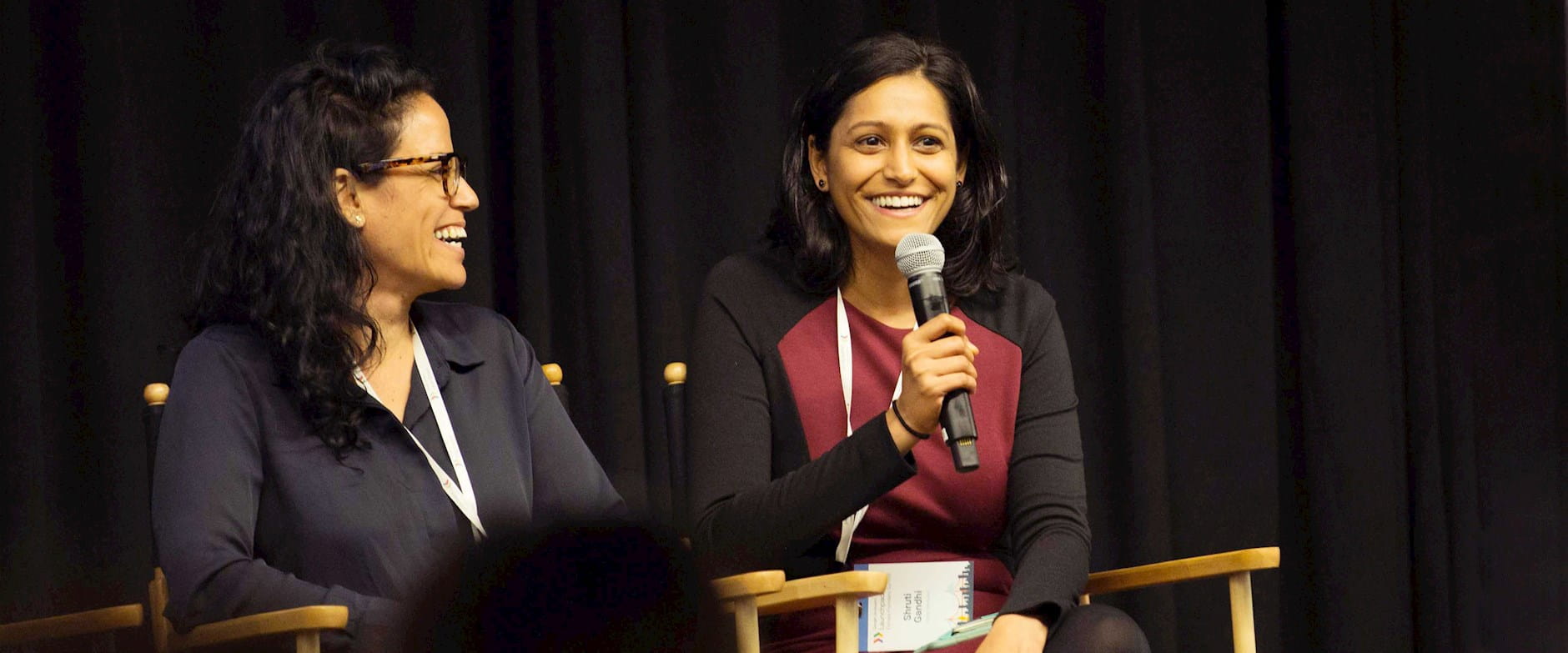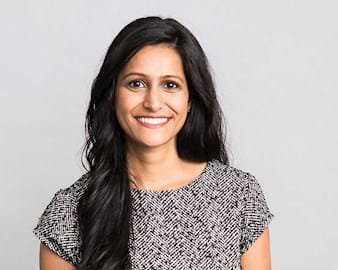
Inclusive Health Care
Through the Polsky Accelerator program, two entrepreneurs are growing their startup to improve health-care access and quality for the LGBTQ+ community.
Inclusive Health Care

Creating a more equitable business world is something Shruti Gandhi, ’12, strongly values. As the founder and managing partner of the San Francisco–based VC firm Array Ventures, she aims to create more opportunities for entrepreneurs who typically don’t receive venture funding—including women and people of color.
“As an immigrant and a woman with an engineering background, I don’t have the same biases when I see founders who are different, who didn’t go to the typical schools or have the typical background investors generally look for in founders,” Gandhi said. “I make an effort to look beyond the typical places we get our deals from.”
The world of venture capital notoriously has a diversity problem. Women account for only 9 percent of VC-backed startup founders, according to the 2019 study Diversity in US Startups. Less than 2 percent are Latinx, and just 1 percent are Black.
This lack of diversity motivated Gandhi to provide resources to help create those opportunities. Amid recent national conversations about racial inequity, Gandhi has pledged $1 million to invest in companies founded by minorities. Additionally, she will offer expert advice to underrepresented entrepreneurs during monthly roundtable sessions. These entrepreneurs will be able to ask Gandhi and other venture capitalists about fundraising, transitioning from their current jobs, and more, all to help them turn their ideas into real businesses.

At Array, Gandhi invests in startups that are using AI, big data, and machine learning to solve all kinds of problems in business. Her investment portfolio includes several leading San Francisco–based startups: Leapfin, which automates complex accounting processes; GoodTime, a talent operations platform that streamlines the interview process; and Pulse Q&A, crowdsourced research platform for C-level executives.
“There’s a hole in the market for enterprise investors at the early stages, so that’s what I want to do,” she said. “There’s a big digital transformation happening in enterprise companies that can make a business much, much more productive.”
She loves to hear from and consider the companies of underrepresented founders, given her own background and experience. After founding her own startup while a student at Chicago Booth, Gandhi learned firsthand that there aren’t enough investors funding enterprise startups run by women and people of color.
Her company, Penseev—named after the Pensieve, a magical, memory-sharing item featured in the Harry Potter series—set out to help social media users make better connections by analyzing their data. Gandhi gained valuable input on building a business from her Booth professors, who helped her take the startup to the Edward L. Kaplan, ’71, New Venture Challenge. She knew the idea was promising, and yet she struggled to raise money. Meanwhile, she noticed other entrepreneurs in the same space had no problems fundraising.
That’s when she decided to make the switch from entrepreneurship to venture capital. “I thought, let’s reverse engineer this VC thing. I’m going to figure out what VCs look for in founders when they’re investing in companies,” she said. “One of the unintentional findings was that VCs love investing in and creating patterns. I learned that I did not fit that pattern, because I did not look like what they looked like. This is when I decided I was going to change and break that pattern.”
Diversity in venture capital isn’t only an equity issue; it’s an innovation issue. In an article for Chicago Booth Review, clinical professor at Chicago Booth and the Polsky Director of the UChicago Global Entrepreneurs Network Waverly Deutsch noted that employees from companies with diverse staff say their colleagues are 90 percent more likely to take risks and 72 percent more likely to challenge the status quo.
Furthermore, having a more diverse staff and leadership team allows companies to reach a wider consumer base. They’re 45 percent more likely to report improving their market share and 70 percent more likely to report capturing a new market. “Inherent diversity is instrumental in helping a company discover and meet the needs of a diverse customer base,” Deutsch wrote. “In fact, the data suggest that homogeneity actually stifles innovation.”
Gandhi said this makes sense. “If you truly want to be a global company, how do you think you can build that by hiring the same kind of people? If you want a diverse customer base, you need diverse teams.”
For Gandhi’s part, she aspires to elevate more people from ethnic and gender minorities into decision-making positions, which she hopes will have a trickle-down effect on diversity across the board—if diverse decision-makers invest in diverse founders, those founders are more likely to hire diverse talent.
“I’ve continuously chosen a career path that is harder and harder to accomplish, but that doesn’t stop me,” she said. “It drives me and motivates me to accomplish it so I can set an example for others. My hope is that they realize they can dream, because I decided to dream.”

Through the Polsky Accelerator program, two entrepreneurs are growing their startup to improve health-care access and quality for the LGBTQ+ community.
Inclusive Health Care
Fellow Boothies Maya Shaposhnik Cadena and Ashley Brooks teamed up to make pet care easier and give pets longer, happier lives.
Founders Fueled by Pet Love
Booth’s Daniel Rogers, ’13, and Seyi Fabode, ’10, have won funding from a new Google program dedicated to bolstering promising Black-founded startups.
Bridging the Racial Gap in VC FundingStay informed with Booth's newsletter, event notifications, and regular updates featuring faculty research and stories of leadership and impact.
YOUR PRIVACY
We want to demonstrate our commitment to your privacy. Please review Chicago Booth's privacy notice, which provides information explaining how and why we collect particular information when you visit our website.